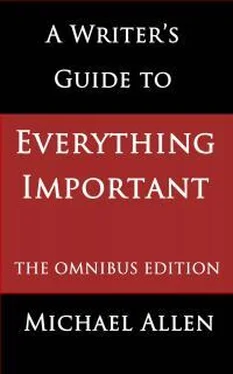My friend and his two colleagues went home and started work on their textbook that very night.
The earnings of the majority
So much for the earnings of the few. What about the average and below average writers?
It goes without saying that the press reports quoted above, revealing the substantial amounts of money earned by some writers, are unfortunately very much the exception. The truth is that most writers earn trivial sums from their books, even if they manage to break into print.
From time to time, various authors’ groups carry out surveys of their members’ earnings. Successive surveys by the UK Society of Authors show that there is always a big gap between the ‘golden nucleus of high earners’ and the majority of authors. Most authors receive ‘little more than a token income from their work.’
The Society of Authors survey published in June 2000 showed that 75% of its 7,000 members earned less than the national average wage.
A similar enquiry into writers’ incomes was carried out in the USA by the Authors Guild. The Guild’s conclusion was that ‘most book authors can’t begin to make ends meet from their writing alone.’
A quarter of the writers who responded to the Guild survey reported that they earned sums which can only be described as small change. Not surprisingly, only 5% of the respondents were able to write full-time; the rest depended on other jobs, such as teaching or journalism.
Not even winning a prestigious literary prize does much for your income. The Authors Guild found that 40% of award winners still earned less than a living wage.
The Hollywood Writers Guild once asked for details of its members’ income and found that two thirds of them were making less than 1,000 dollars a year. In fact, the top five executives in Hollywood earned more, in total, than the whole 9,000 members of the Writers Guild put together.
The California branch of the screenwriters’ union discovered that, over a ten-year period, more millionaires had been created by winning the state lottery than from screenwriting! To be precise, 1,333 people had won lottery jackpots of a million dollars or more, while only 393 people had made a million dollars from their film scripts.
In UK publishing, the simple fact is that many of the books which are published with such high hopes end up by selling well under a thousand copies.
I was recently involved in helping a distinguished civil servant to get his autobiography published. This was eventually achieved when the gentleman in question agreed to pay a publisher the full cost of printing and other production costs. The book eventually sold 400 copies, and the publisher regarded this as a success.
For a number of years I was the head of an academic publishing operation, and our most successful publication sold only 800 copies. One of our books sold less than 100, but here again we had fortunately arranged for a sponsor to cover the loss.
The conclusion to be drawn from the facts set out in this section could not be clearer or simpler. It is that, even if you do succeed in having your work presented to the public, by a well established firm, you are statistically unlikely to make any significant money out of it – significant in the sense that it will have a dramatic impact on your way of life. It’s not like winning the lottery, though a surprising number of your friends will think that it is.
2.3 Fame
This section examines the second possible form of success for a writer: becoming famous.
While I was writing this ebook, The Times published a profile of American novelist Sylvia Day. The article was published in the Times ’s Saturday colour supplement. The cover of the supplement carried a full-page photo of Ms Day, looking very glamorous in an exotic setting, with a handsome young man lolling in a pool beside her. The strapline read: ‘The new queen of Mummy porn – how to outstrip 50 Shades of Grey. ’
Inside the magazine there was a second glamorous photo of our author, this time stretching over two full pages, and overleaf the actual interview occupied two further pages of text.
It turns out that Sylvia Day has signed an eight-figure deal (i.e. at last $10 million) for two further books in ‘her massively successful and very racy series of Crossfire novels.’ And there’s more, mostly about how brazenly erotic the sex scenes are.
This article will serve very well to demonstrate how fame comes (very occasionally) to writers of popular fiction. Write the right stuff, pull in enough cash, and you will be written up in the glossy magazines.
Such then is the nature of fame, for the purposes of this discussion. And, for some young writers, having the Sylvia Day type of newspaper article written about them seems to be intensely desirable. They imagine that fame is a benefit which is very much worth having.
Presumably fame is seen as desirable because people believe that the famous live better lives. Fame is associated in the public mind with wealth, comfort, glamour, and a release from the drudgery of life as it is lived by most of us.
Possibly. But absolute fame tends towards absolute destruction. Worldwide fame brings with it almost obscene levels of wealth, a circumstance which inevitably seems to involve the employment of large numbers of yes-men and women. You lose touch with reality, as the examples of Elvis Presley and Michael Jackson demonstrate.
This is a matter on which you must make up your own mind, but personally I really don’t recommend the single-minded pursuit of fame. Surely the beauty of writing is that you can be very successful, in the sense of making some money, and be recognised as a good solid performer within your particular genre, without the inconvenience of having your face recognised. You don’t even have to use your own name! In England, two of the most widely read women writers in the latter part of the twentieth century were both men: they were known professionally as Jessica Stirling and Emma Blair.
Perhaps the worst possible fate that can befall a writer is not that she fails to become famous, but that she does become famous without really understanding how the trick was done. This disastrous circumstance will be discussed further in Part 5, which is entitled ‘The price we pay’.
2.4 Literary reputation
Literary reputation is the third of the potential forms of success which can be obtained through a writing career.
But who in the world wants it? In my opinion, this is another perceived benefit which is actually more of a liability; still, it takes all sorts, so we must have a close look at literary reputation and all that it entails.
What is literary reputation?
Having a literary reputation means that you are known for writing Good Books, i.e. novels which are among The Most Important Books of Our Time (allegedly). Serious critics identify you as a Someone To Watch.
I apologise for all the capital letters, but people who live and work and have their being in this field always tend to sound as if their words are in UPPER CASE. We’re talking meaningful, career-moulding stuff here. So, let’s try to take all this nonsense as seriously as we possibly can.
Literary reputation turns upon the idea that there are two principal sorts of books: good books, and trash.
Back in your schooldays, when the English teacher found you reading a Jilly Cooper romance or one of Ian Fleming’s James Bond books, what did she say to you?
She said, ‘Why don’t you read a good book, Mary (or George)? Instead of that worthless rubbish.’
Well, teacher must be right, mustn’t she? If she says so, there surely must be a distinction between proper literature on the one hand and garbage on the other. Mustn’t there?
Читать дальше












